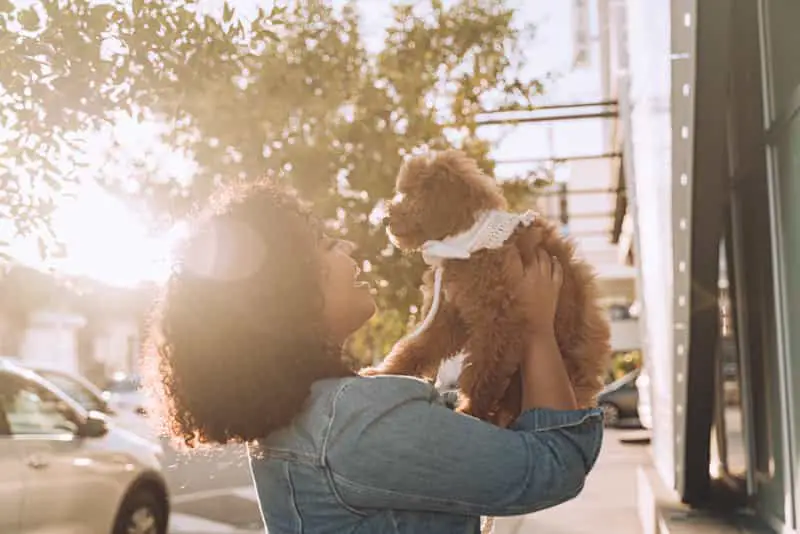Tips And Tricks

Even though crazy energy is expected from your pup, you may want to find some resources or games that can help manage this behavior. Over excitement is expected from Goldendoodles, so these tips will not get rid of it. These are great ways to stop the energy from becoming undesirable behavior, though. In the early stage (puppyhood), diversion and prevention are the best ways to minimize overexcitement.
Time To Get Active
If one of the ways your dog’s energy manifests is running around the house, they may benefit from more exercise.
Most dog breeds need a healthy walk or play daily to tire themselves out; in this case, Goldendoodles have so much energy that this is one of the most important aspects of caring for one.
If your doodle is overactive, it can help to take an hour of walk time daily to burn some of that energy. It’s not the end of the world if you’re busy and you miss a day of walks. However, you may see an energy spike from just one missed session. A bonus tip for a good walk is to go somewhere where they can run around off-leash; this is great for an energy-filled doodle.
Other good active alternatives are bringing your dog to a social outing, playing fetch, taking your doodle on a run/jog, and letting your doodle play with kids while you’re watching. Getting your dog active is the first step to take if you want to manage their behavior. Remember not to overdo it though, watch for signs that they can’t keep up.
Toys Can Be Helpful
Playing fetch with sticks is a classic game and can help with overactive doodles, but consider investing in some specialized toys.
Dog toys can provide intellectual stimulation and benefit from being ‘self exercise’ for a dog. If doodles are bored, they can become excited when something unusual happens, resulting in a crazy episode. Mental stimulation through toys can result in fewer overreactions and seemingly calmer behavior. Boredom reportedly hurts dog’s feelings, too, so make sure they’re happy!
Even a simple chew toy can help relieve stress, helping to reduce barking and overstressed out behaviors. Indoor dog games and toys are great, allowing doodles to play without the hassle of scheduling outside time.
Good toys are rubber chew toys, tennis balls, stuffed animals, flavored toys, ropes, treat dispensers, puzzles, and squeaky toys. Note that squeaky toys are a favorite – so if you buy one, you will be putting up with additional noise!
Scent Training
Scent training (or nose work) is a simple pastime for Goldendoodles and can wear them out mentally and physically. This is also a great indoor activity. Inability to focus and lack of concentration are standard crazy doodle behavior. Scent training can be done at home to engage their attention and promote calmness.
Start by playing hide and seek with your doodles favorite treats – these are called ‘hides.’ You can start with empty cardboard boxes and progress onto other areas of the house, be as creative as you want here!
Good hides for Goldendoodles are boiled chicken, dried liver snacks, or even grated cheese; see what your dog reacts best with.
Once your dog has found the hide, reward them with an extra set of treats. As you play, progressively make each hide more challenging to engage them. This could be done by placing hides in a plastic container that makes an interesting noise, getting your dog to reach into boxes with their nose, or reducing the number of hides but putting out extra boxes to search through.
The increase in difficulty will help boost self-assuredness; while doodles often have self-confidence, this is still an excellent exercise for them. Sniffing is mentally and physically tiring for a Goldendoodle, which can help use up their crazy energy.









